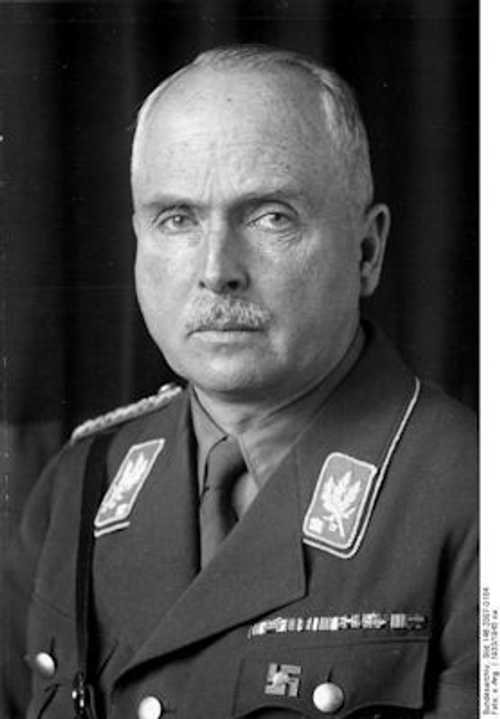
German Leadership
The Unhappy Prince - a Slave of Duty.
Bundesarchiv.
Portrait 'photo of Charles Edward of Saxe-Coburg-Gotha, last ruling prince of that Principality, whose life was proof - if such were needed - that being born a prince is not necessarily all fun. As the name implies, Charles Edward (Karl Eduard) was a member of a complex of royal families the ... um ... genes of which had penetrated most of the ruling Houses of Europe, thanks largely to the scheming of Queen Victoria of Great Britain (Charles Edward's paternal great-grandmama) and her favourite uncle, King Leopold I of Belgium (yes, another Saxe-Coburg-Gotha, of course). Given the political circumstances of his youth, his position proved particularly problematic since he was also (of course) a first cousin of another of Victoria's descendants, Kaiser Wilhelm II of Germany, who took a particular interest in his young cousin's upbringing. The Slave of Duty thing started young. As he was born after his father's death, he immediately inherited his father's British titles, principally the Dukedom of Albany and status as a Prince of the British Royal Family (at that time, British Saxe-Coburg-Gotha). His mother, who idolised her late husband, brought him up with a heavy emphasis on his princely duty and the need to behave in such a way as would have made his late papa proud. A relatively relaxed (if no doubt somewhat confusing) English upbringing with German embellishments came to an end at age 16 when, in 1900, the Principality of Saxe-Coburg-Gotha fell vacant, and his uncle, the (British) Duke of Connaught, along with his son, Prince Arthur of Connaught, having no interest in being "exiled" from England to Germany, renounced their superior titles to the Principality, leaving the under-age Charles Edward, as next in line, to assume the ducal throne. Things went reasonably well until 1914, when Charles Edward was forced to take sides between the land of his birth and his adopted country, now at war. After some hesitation, he judged his duty to his German duchy to be the superior one, and elected for Germany, serving in "Cousin Willy's" army as a general in WW1 (though not very actively). The result of this (to cut a long story short) was that by 1919, Charles Edward found himself stripped (if not of his estates), certainly of his German ducal title and his British titles, and regarded as a traitor in England and by most of his English relatives. Since he had, objectively, done nothing wrong, he obviously felt a bit sore about all this. What does a spurned prince do in the circumstances ? Well, as a person with good reason to fear the "Communist Tide" that seemed to be rising in Germany at the time, he gravitated increasingly towards extreme right-wing politics; not, in his case, towards the Prussian-dominated reactionaries (for whom he probably felt little love) but towards the radicals - and ultimately towards the Nazis. He was just the sort of "image recruit" that Hitler wanted. He finally joined the Party in 1935; also the SA, in which he rose to the rank of Obergruppenfuhrer. He served as Chairman of the Nazi-controlled German Red Cross from 1933, and as a Nazi Reichstag Deputy from 1937. Hitler also employed him as President of the officially-sponsored Anglo-German Friendship Society, in which role he was supposed to promote an "understanding" between Nazi Germany and Britain - a strange mission, given that at least as far as most of the British Royal Family was concerned, he was about as popular as Mrs Simpson. When war came again, three of his sons served in the Wehrmacht, one being killed while on duty. Absolutely none of this did much to increase his popularity with the victors of 1945, the more so since his association with the German Red Cross suggested that he might not have been exactly without knowledge of some of the less savoury activities of Nazi medics from 1939 on (human vivisection, Aktion T4 Euthanasia programme, that sort of thing). As a result, he was enthusiastically and expensively deNazified, and reduced to near penury. Charles Edward's unfortunate life ended quietly in Germany in 1954. Apart from his immediate family, he continued to receive support and comfort from the one English relative who had never rejected him, his kind-hearted sister, Princess Alice of Athlone. It was the end of a most extraordinary life but one, I suspect, that few of us would have enjoyed without reservation. For one born so high, he really did get some bad breaks. Well, I suppose that if they bothered to think about it, Wills and Harry might reflect that having to put up with the paparazzi and shake all those hands may be tiresome, but at least one of their relations had it much worse ... Best regards, JR.
3294 Views
3/6/2012
